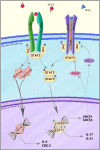The genetic backbone of ankylosing spondylitis: how knowledge of genetic susceptibility informs our understanding and management of disease
- PMID: 35939079
- PMCID: PMC9548471
- DOI: 10.1007/s00296-022-05174-5
The genetic backbone of ankylosing spondylitis: how knowledge of genetic susceptibility informs our understanding and management of disease
Abstract
Ankylosing spondylitis (AS) is a seronegative, chronic inflammatory arthritis with high genetic burden. A strong association with HLA-B27 has long been established, but to date its contribution to disease aetiology remains unresolved. Recent insights through genome wide studies reveal an increasing array of immunogenetic risk variants extraneous to the HLA complex in AS cohorts. These genetic traits build a complex profile of disease causality, highlighting several molecular pathways associated with the condition. This and other evidence strongly implicates T-cell-driven pathology, revolving around the T helper 17 cell subset as an important contributor to disease. This prominence of the T helper 17 cell subset has presented the opportunity for therapeutic intervention through inhibition of interleukins 17 and 23 which drive T helper 17 activity. While targeting of interleukin 17 has proven effective, this success has not been replicated with interleukin 23 inhibition in AS patients. Evidence points to significant genetic diversity between AS patients which may, in part, explain the observed refractoriness among a proportion of patients. In this review we discuss the impact of genetics on our understanding of AS and its relationship with closely linked pathologies. We further explore how genetics can be used in the development of therapeutics and as a tool to assist in the diagnosis and management of patients. This evidence indicates that genetic profiling should play a role in the clinician's choice of therapy as part of a precision medicine strategy towards disease management.
Keywords: Ankylosing spondylitis; Comorbidity; Genetics; Polygenic risk; Spondyloarthropathy; Therapeutics.
© 2022. The Author(s).
Conflict of interest statement
The authors have no connections or financial backings which have influenced or biased the content of this work. The authors declare that the contents of this article have not been previously published, either in whole or in part, nor are currently under consideration for publication elsewhere.
Figures

References
Publication types
MeSH terms
Substances
LinkOut - more resources
Full Text Sources
Medical
Research Materials

